The mid-1970s saw the beginnings of the ebb the ‘red decade’ ushered in by the fourfold circumstances of national liberation struggles (in Vietnam and Palestine in particular), the worldwide student and youth movement (Germany, Japan, the USA, Mexico . . .), factory revolts (France and Italy) and the Cultural Revolution in China. It finds its subjective form in a resigned surrender, in a return to customs — including electoral customs – deference towards the capitalo-parliamentarian or ‘Western’ order, and the conviction that to want something better is to want something worse. It finds its intellectual form in what, in France, acquired the very strange name of ‘the new philosophy’. Despite the change of name, we have here, almost unchanged, all the arguments of the American anti-communism of the 1950s: socialist regimes are loathsome despotisms and bloody dictatorships. At the level of the state, this socialist ‘totalitarianism’ must be contrasted with representative democracy which, while it is of course imperfect, is by far the least bad form of government. At the moral level, which is the most important in philosophical terms, we must preach the values of the ‘free world’ centred on and protected by the United States. Because it has ended in failure all over the world, the communist hypothesis is a criminal utopia that must give way to a culture of ‘human rights’, which combines the cult of freedom (including, of course, freedom of enterprise, the freedom to own property and to grow rich that is the material guarantee of all other freedoms) and a representation in which Good is a victim. Good is never anything more than the struggle against Evil, which is tantamount to saying that we must care only for those who present themselves, or who are exhibited, as the victims of Evil. As for Evil, it is everything that the free West designates as such, what Reagan called ‘the Evil Empire’. Which brings us back to our starting point: the communist Idea, and so on.
For various reasons, this propaganda machine is now obsolete, mainly because there is no longer a single powerful state claiming to be communist, or even socialist. Many rhetorical devices have of course been recycled in the ‘war against terror’ which, in France, has taken on the guise of an anti-Islamist crusade. And yet no one can seriously believe that a particularist religious ideology that is backward-looking in terms of its social vision, and fascistic in both its conception of action and its outcome, can replace a promise of universal emancipation supported by three centuries of critical, international and secular philosophy that exploited the resources of science and mobilized, at the very heart of the industrial metropolises, the enthusiasm of both workers and intellectuals. Lumping together Stalin and Hitler was already a sign of extreme intellectual poverty: the norm by which any collective undertaking has to be judged is, it was argued, the number of deaths it causes. If that were really the case, the huge colonial genocides and massacres, the millions of deaths in the civil and world wars through which our West forged its might, should be enough to discredit, even in the eyes of ‘philosophers’ who extol their morality, the parliamentary regimes of Europe and America. What would be left for those who scribble about Rights? How could they go on singing the praises of bourgeois democracy as the only form of relative Good and making pompous predictions about totalitarianism when they are standing on top of heaps of victims? Lumping together Hitler, Stalin and Bin Laden now looks like a black farce. It indicates that our democratic West is none too fussy about the nature of the historic fuel it uses to keep its propaganda machine running. It is true that, these days, it has other fish to fry. After two short decades of cynically unequal prosperity, it is in the grip of a truly historical crisis and has to fall back on its ‘democratic’ pretensions, as it appears to have been doing for some time, with the help of walls and barbed-wire fences to keep out foreigners, a corrupt and servile media, overcrowded prisons and iniquitous legislation. The problem is that it is less and less capable of corrupting its local clientele and buying off the ferocious foreign regimes of the Mubaraks and Musharrafs who are responsible for keeping watch on the flocks of the poor.
What remains of the labours of the ‘new philosophers’ who have been enlightening us — or, in other words, deadening our minds – for 30 years now? What really remains of the great ideological machinery of freedom, human rights, the West and its values? It all comes down to a simple negative statement that is as bald as it is flat and as naked as the day it was born: socialisms, which were the communist Idea’s only concrete forms, failed completely in the twentieth century. Even they have had to revert to capitalism and non-egalitarian dogma. That failure of the Idea leaves us with no choice, given the complex of the capitalist organization of production and the state parliamentary system. Like it or not, we have to consent to it for lack of choice. And that is why we now have to save the banks rather than confiscate them, hand out billions to the rich and give nothing to the poor, set nationals against workers of foreign origin whenever possible, and, in a word, keep tight controls on all forms of poverty in order to ensure the survival of the powerful. No choice, I tell you! As our ideologues admit, it is not as though relying on the greed of a few crooks and unbridled private property to run the state and the economy was the absolute Good. But it is the only possible way forward. In his anarchist vision, Stimer described man, or the personal agent of History, as ‘the Ego and his own’. Nowadays, it is ‘Property as ego’.
Which means that we have to think about the notion of failure. What exactly do we mean by ‘failure’ when we refer to a historical sequence that experimented with one or another form of the communist hypothesis? What exactly do we mean when we say that all the socialist experiments that took place under the sign of that hypothesis ended in ‘failure’? Was it a complete failure? By which I mean: does it require us to abandon the hypothesis itself, and to renounce the whole problem of emancipation? Or was it merely a relative failure? Was it a failure because of the form it took or the path it explored? Was it a failure that simply proves that it was not the right way to resolve the initial problem?
A comparison will shed light on my conviction. Take a scientific problem, which may well take the form of a hypothesis until such time as it is resolved. It could be, for example, that ‘Fermat’s theorem’ is a hypothesis if we formulate it as: ‘For >n, I assume that the equation x2 + yn = zn has no whole solutions (solutions in which x, y and z are whole numbers).’ Countless attempts were made to prove this, from Fermat, who formulated the hypothesis (and claimed to have proved it, but that need not concern us here), to Wiles, the English mathematician, who really did prove it a few years ago. Many of those attempts became the starting point for mathematical developments of great import, even though they did not succeed in solving the problem itself. It was therefore vital not to abandon the hypothesis for the three hundred years during which it was impossible to prove it. The lessons of all the failures, and the process of examining them and their implications, were the lifeblood of mathematics. In that sense, failure is nothing more than the history of the proof of the hypothesis, provided that the hypothesis is not abandoned. As Mao puts it, the logic of imperialists and all reactionaries the world over is ‘make trouble, fail, make trouble again’, but the logic of the people is ‘fight, fail, fail again, fight again … till their victory’.1
It will be argued here, via a detailed discussion of three examples (May ’68, the Cultural Revolution and the Paris Commune), that the apparent, and sometimes bloody, failures of events closely bound up with the communist hypothesis were and are stages in its history. At least for all those who are not blinded by the propagandist use of the notion of failure. Meaning all those who are still inspired by the communist hypotheses in so far as they are political subjects, and irrespective of whether or not they actually use the word ‘communism’. In politics, it is thoughts, organizations and deeds that count. Proper nouns, such as Robespierre, Marx and Lenin, are sometimes used as referents. Common nouns (revolution, proletariat, socialism . . .) are in themselves much less capable of naming a real sequence in the politics of emancipation, and their use is rapidly exposed to an inflation that has no content. Adjectives (resistant, revisionist, imperialist…) are usually used only for propaganda. That is because universality, which is the real attribute of any corpus of truths, will have nothing to do with predicates. A real politics knows nothing of identities, even the identity — so tenuous, so variable — of ‘communists’. It knows only fragments of the real, and an Idea of the real is testimony to the fact that the work of its truth is ongoing.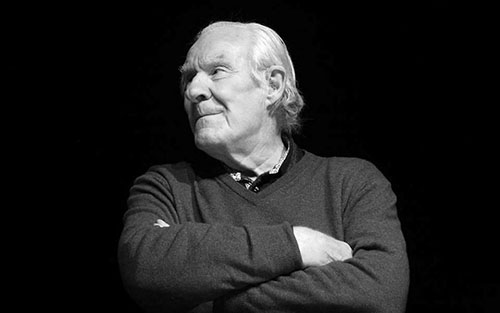
Between the middle and the end of the ‘red years’ I was speaking about earlier, I had several opportunities to reach a verdict on failure, on the positive meaning of defeats. A revolutionary defeat is in fact always divided into a negative part (deaths, imprisonments, betrayals, loss of strength, fragmentation), which is often very obvious at the time, and a positive part, which usually takes a long time to emerge (a tactical and strategic reckoning, a change of action-models, the invention of new forms of organization). Between 1972 and 1978, I wrote what I called a romanopera [novelopera] that I called L‘Echarpe rouge [The Red Scarf], It was published by Maspero in 1979, and performed in Lyon, Avignon and then at the Palais de Chaillot in 1984 in the form of a real opera, with music by Georges Aperghis and directed by Antoine Vitez. This work followed, line by line, the schema of Claudel’s Soulier de Satin (which Vitez directed in Avignon a few years later). Basically, I took up the challenge thrown down to popular theatre by Claudel’s creation of a form of theatre that was at once modern and Christian. And it is not for nothing that the title of Act II, Scene VI is Choeur de la divisible défaite [Chorus of the divisible defeat]. I will always remember the musical power of the chorus (all dressed in workers’ overalls) while Pierre Vial – an exceptional actor – strode up and down the stage carrying an old umbrella and hesitantly murmuring, half-convinced, half-nostalgic: ‘Communism! Communism!’
The scene has to be situated. The regional Party leadership in the working-class North East of the imaginary country in which the play is set has launched a sort of civil insurrection, and has, more specifically, called a general strike. That offensive gives the whole of the play’s second act its title (The Autumn Offensive). It ends in complete failure and, after stormy discussions in all the revolutionary organizations, it is discussed, criticized and rejected in favour of military action on the part of the insurgents, this time under the leadership of the South of the country.
The scene I want to cite comes immediately after the failure of this premature ‘autumn offensive’. It is set outside the gate of the SNOMA factory, early in the morning. The defeated workers are returning to work, heads bowed, between two lines of soldiers, managers and police. The workers’ chorus was, according to the stage directions, bom of this compact procession. The entire chorus has to do with how defeats can be divided and subsumed into a higher mode of thought. Here it is:
And so, one morning the colour of dead earth, we have once more lowered our banners very low and very solemnly. We have spumed our insurrection.
And so, here we are once more, the workers of SNOMA, in a town that has been bled try, heads bowed and defeated.
Once again, our efforts were not enough to force the outcome of the dispute.
The threshold of a reversal of positions.
I speak here of the interrogative prematurity of our watchful uprising.
I speak of the isolation of the proletariat in the undecided town, and of a far-away offensive.
I speak here of its failure, and the bitterness.
But!
No one has the strength to make the mill of history run backwards for any length of time.
This is the time for both a reckoning and an understanding, the time of the tension through which, for the defeated,
The bad thing of failure turns into the combative excellence of knowledge [un savoir].
[•••]
Join us, you, the defeated, the legendary defeated, with the fabulous sequel to your non-acceptances!
You! The oppressed of times gone by. Slaves of the sun-sacrifices who were mutilated for the splendour of tombs! The ploughmen who were sold, together with the earth that was the same colour as them! The children who have been expatriated into the bloody service of the cotton and the coal, now that the meadows have been fenced in.
Have you accepted this? No one ever accepts anything!
Spartacus, Jacquou le Croquant. Thomas Münzer!
And you: the tramps of the plains, the Taiping rebels of the great loess, Chartists and Luddites, plotters from the labyrinth of the banlieues, egalitarian Babouvists, sans-culottes, Communards, Spartacists! All people from the popular sects and soviets of the sprawling quartiers, sectionnaires from the days of the Terror, men with forks and pikes, the men of the barricades and the burning chateaux! And the host of the many others who are violently striving to discover their plenitude,
And who, as they invent their plenitude, are at work in the continental shattering of history!
The sailors who threw their officers to carnivorous fish, the Utopians of solar cities who opened fire in their territorial outposts, Quechua miners from the Andes with an appetite for dynamite! And the successive tidal waves of African rebels sheltering behind flaming leopard-skin shields in the colonial stench! Not forgetting the lone man who took down his hunting rifle and, like a suspicious wild boar, began to resist the aggressor in the forests of Europe.
And the deployment of great processions of all kinds in the streets: sinister-looking students, girls demanding women’s rights, the banners of great clandestine unions, old men rising up in memory of general strikes, nurses in their veils, and workers on bicycles!
Join us and give us the countless inventions and the multiform simplicity of people power: the mob orators and warriors of the peasant leagues, the camisard prophets, the women of the clubs, associations and federations, the workers and the lycéens of the comités de base, the action committees, the triple unions and the grand alliances! Factory soviets, soldiers’ soviets, people’s courts, the great village commissions formed to share out the land, to open an irrigation damn, or to form a militia! Revolutionary groups demanding price-controls, the execution of corrupt officials and for tight controls on food stocks!
And those, though they are few of them and this is a period that goes against the general trend, who cling to the correct idea in basements filled with the din of manual rotary presses. And then there are those who, armed with long bamboo poles, know how to skewer the fattest of police officers, and for whom everything else is a mystery.
All of you! Brothers of immense history! You look at our failure and you say: what are you giving up there? Didn’t our failure extend beyond death itself? Didn’t we fail interminably?
Let any man who dares to bring us before the court of that failure stand! And let him be beyond all shame!
We gave birth to your uncertain certitudes. And your strength in the imminence of victory is no more than the legacy of what we seemed to be doing.
And so, are you going to give up? Are you going to abolish our huge efforts, and the historical birth of our universal revenge,
In the reactionary verdict and bowed heads of the defeated?
No! I say, No!
The contented and the fearful are no concern of ours. It is the tenacious people’s memory that creates the great hole in the world where the semaphore of communism has been planted century after century.
People of all times! People of all places! You are with us!
I would simply like to emphasize the relationship, which is spelled out in the summing up of the whole text, between the subjective possibility of getting over a defeat, and the vitality – both international and supra-temporal — of the communist hypothesis. A meditation on failure changes completely if we relate it not to the pure interiority — intellectual or tactical — of a politics, but to the link between that politics and its historicity. The thought of failure emerges at the point when a politics appears before the court of History, and when it sees itself there. And it is the communist hypothesis that represents and imagines the consistency of History.
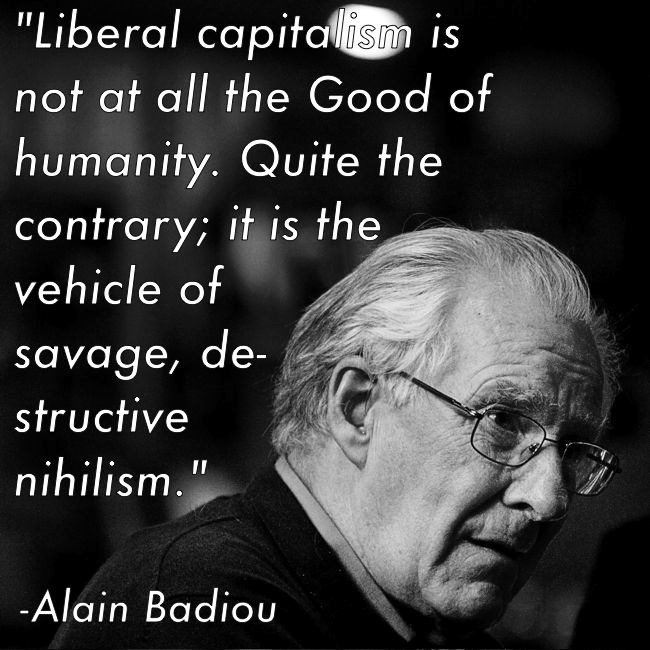
At the beginning of the 1980s we were called to a different reckoning of what was going on. The ‘red years’ were well and truly over. The Mitterrand government conjured up all the old illusions and chimeras of the ‘left’, which consisted mainly in corrupting a fraction of the petty bourgeoisie by inviting it into the vicinity of power (even Deleuze accepted an invitation to dine with the President) and handing out credits to the ‘associations’ it was so keen on. ‘Cultural policy’ was a good name for this system of illusions. We had here a defeat without glory, and an unrecognizable failure in power. It was to last for over 20 years (probably until the present crisis) and its name was the Socialist Party. Oh! We ought to be able to say once more what Aragon, with the encouragement of Stalin, once said: ‘Open fire on the dancing bears of Social Democracy!’2 But no one even thinks of doing so.
On the other hand, it has to be said that the final convulsions of state socialism and the armed struggles associated with it were unbearably violent. The Red Guards of the Cultural Revolution were – as young people so often do when they are left to their own devices and obey the herd instinct — already committing countless crimes during the most confused moments of the Cultural Revolution. In Cambodia, the revolutionary Khmer Rouge thought they could use commandos of very young boys and girls drawn from the oppressed peasant masses, who had always been invisible, and who were suddenly given the power of life and death over anything that recalled the old society. Those young killers, whose descendants can still be seen today — especially in Africa — subjected the whole country to their reign of blind revenge, and devastated it without pity. In Peru, the methods used by Sendero Luminoso to forge the discipline of the rebellious Indian peasants were little different: ‘Anyone I suspect of not being with me must be killed.’ And the propaganda of the ‘new philosophers’ obviously made unlimited use of these terrifying episodes.
We were confronted with a sort of twofold notion of failure. We had before our very eyes the classic rightist failure: those who were weary of militant action rallied to the delights of parliamentary power, and the renegades made the transition from Maoism and active communism to the cosy home of the Socialist senator for the Gironde. But we could not forget the ‘ultra-left’ failure which, by handling every contradiction — even the slightest — with brutality and death, trapped the entire process within the dark limits of terror. This in fact seems to be unavoidable at times when the political dynamic of revolutions can no longer invent its becoming or assert itself for what it is. Even Robespierre had to fight on two fronts as 1794, and therefore his own failure, drew closer: against the citra-révolutionaires, or the rightists who followed Danton, and against the ‘ultra-revolutionaries’ and enragés who followed Hébert.
I devoted my play to this problem. Once again, it follows the outline of a play by Claudel (La Ville), and it also uses the most important episodes in St Paul’s mission, including the quarrel between Paul and Peter over the question of the universality of the gospel, which occurred in Antioch. The idea is that the revolutionary theme must not cling to a traditional particularity (to the rituals of being-Jewish in the case of the apostle Peter, or to the assumption that there is no alternative to the laws of the market economy and representative democracy in the case of today’s renegades), and that the destruction of those particularities (Christian- inspired anti-Semitism or the Khmer Rouge’s execution of the supporters of the old world) is not the only issue at stake. Universality, represented in the play by the character of Paula, presupposes that we resist our fascination with established powers, and our fascination with their pointless destruction. No peaceful continuation, and no ultimate sacrifice. Politics is a construct that certainly separates itself from whatever is dominant but it defends that separation – through violence if need be – only to the extent that, in the long term, it sheds light on the fact that it is only within the universal that we can all live under the rule of equality.
describes a victorious and terribly destructive revolution whose leaders finally, and for the reasons I have just outlined, take the unheard-of decision to renounce the power they have won.
The first fragment I will cite here deals with Céphas’s refusal to go on holding any post. He led the revolution, at the cost of terrible destruction. He is giving up because he loves only destruction, and because he prophesies that a new state is about to be reconstructed, built and created. And he is already bored with that prospect. He expresses himself thus:
Cephas. This is the end. I will lie down in the ashes of states. I will go away with the old texts.
Farewell, I am leaving, giving up.
Camille. What! Cephas! You can’t leave things up in the air! You’re not going to leave our undertaking leaderless in the midst of disaster and necessity!
David. Without any explanation! Without any critique! Turning your back when we should be picking up stones!
Cephas. I joined with you in the jurisdiction of command in order to do certain things, and we have done them. We hastened the decline of this country, which we took back to its terroristic origins.
The only thing that lies beyond victory is defeat. No, no! Not a sudden defeat and overthrow! The slow, irreversible defeat of that which has to come to terms with what exists.
Not the useless defeat that is covered in glory, not the legendary catastrophe. On the contrary: a useful and fertile defeat, the kind of defeat that brings back the peace of work and restores the might of the state.
I leave you the grandeur of that kind of defeat, not out of pride or lack of interest in its patience, but because I am ill-suited to it.
The orderliness of my idea of disorder now stands in the way of the imperative to build.
But let the lie be seen in all its clarity. In the clarity of what we have destroyed beneath our feet.
May the rubble embedded in the restoration maintain its hold over you, and may the stink
Persist!
Camille. Don’t go, Cephas.
David. Stay. If power offends you, be the man who disturbs it.
Cephas. In the beginning, I enjoyed being a leader. These things are not to be scorned:
The circular, as short as a telegram from a lover, that brings lycéens who have dropped out of school to their feet on the other side of the country, or that foments a shop-floor uproar in the banlieues.
The ovations of the crowd as you stand on a platform in the summer, between the red flags and the portraits.
Or the ceasefire during the winter we spend in our tents.
But all that is over, and all that remains is the fear of the gaze.
That is why I will leave the circle, and chalk the word ‘glory’.
As we can see, the failure for which Céphas finds himself so ill-suited is the rightist failure, the ‘slow’, inglorious failure of reconstructions and repetitions. The moment when we revert from revolution to state.
Paula is talking about the other failure — that of blind rage—when she enjoins her son, who has become leader after the departure of Cephas, to give up power. Here is the scene:
David. What exactly are you asking for?
Paula. I’ve told you. I’m asking you to give up power.
David. But why do you insist on using your maternal function for counter-revolutionary purposes?
Paula. You are the counter-revolution. You exhaust all trace of the will to justice. Your politics are vulgar.
David. And you are so distinguished.
Paula. Listen to me. Let me speak as though I were a man. Our hypothesis was not, in theory, that we were going to resolve the problem of good government. Isn’t that so? We did not involve ourselves in the philosophers’ speculations about the ideal state. We said that the world could stand the trajectory of a policy that could be reversed, a policy designed to put an end to politics. To domination, in other words. And you agreed with that.
David. I’m listening, professor.
Paula. It so happened that the historical realization of that hypothesis was swallowed up by the state. A liberating organization merged completely into the state. It has to be said that, when underground and at war, it devoted itself completely to the conquest of the state.
And so, the will to emancipation escaped its own origins. It must be restored to them.
David. What do you mean?
Paula. I mean it has to be replaced.
No correct policy can now argue that it is a continuation of the work that has already been done. Our mission is to unseal, once and for all, the consciousness that organizes justice, equality, the end of states and imperial rackets, and of the residual platform where the concern for power sucks in every form of energy.
What an impact it would have if you issued a proclamation of fidelity! In practice, that would mean returning to the path of the collective consciousness and its subjectivation! You would leave behind the state that loves its pomp, and its murderous stupidity.
David. We have left it behind, like an imperative that was more powerful than our will, the sacrifice of thousands of people, and our victory is its only meaning. Are we going to gather together all the dead in the summer of our absurdity, for one sublime abdication?
Paula. They’ve already played the parti des fusillés card.3 What is the sense in placing the meaning of politics under the jurisdiction of the dead? That bodes ill. And let me remind you that crowds of people are dying now, not for the sake of victory, but because of our victory. Whatever choice you make, you will be forced to select the corpses that justify your actions.
David. Where does this moral blackmail get us? Pity is pointless. When you are surrounded by devastation, reconstruction is the order of the day. If we have to borrow from the past, we will do so without any shame. Who can imagine that, after such a shock, the old state of affairs will emerge once more, as though nothing had happened? The world has changed for ever. You just have to trust it. My dear, dear mother, you see things from below. You are not one of the decision-makers.
Paula. That’s an old trick, David. I am telling you that there is only one possible decision. Everything else is just a matter of using the brutal means at your disposal to manage constraints. Of course you’ll do something new. You’ll paint the surface of the sun grey.
David. Tell me precisely who you are. Are you condemning what we have done? Are you on the side of the whites, of the scum that are lying low? I’m warning you: my heart is growing cold again.
Paula. You’ve done what had to be done. The little imperial beast has been exhausted, and is hiding out somewhere in the hills. You were the ones who sacrificed it. Thanks to you, the first cycle in the history of justice is now unbroken. That is why you must proclaim that a second power is emerging.
David. You’re certainly not suggesting that we need more power. You’re suggesting, on the contrary, that we renounce it, and for a long time to come.
Paula (takes out a big sheet of paper and unfolds it). Look at this military chart. My brother Claude Villembray gave it to me just before we had him put to death. There’s the dream, there’s the childhood. You really would have liked to conquer the world, just like any old king. Are you going to go on with that never-ending childish passion? Power is not the mark of the human race’s greatness. The featherless biped must get a grip on himself and, unlikely as it seems, go against all the laws of nature and all the laws of history, and follow the path that means that anyone will be the equal of everyone. Not only in law, but in their material truth.
David. You’re such a fanatic!
Paula. No, I’m not. On the contrary, I urge you to abandon all fanaticism. The decision you have to take has to be taken coldly. For anyone who gives in to the passion for images, it is incomprehensible. Forget about the obsession with conquest and the totality. Follow the thread of multiplicity.
(Long silence)
David. But, tell me Paula: how can we prevent everything from becoming dispersed and disunited if we make the unprecedented gesture you are suggesting?
Paula. Don’t think I’m giving you a recipe. For such a long time, the impasse was that politics was centred on and represented by the state alone, so I am telling you to get out of that impasse, and to prove that the political truth circulates endlessly in a people that leans against the factory walls and finds shelter from the state in its inner strength.
It is like an event, as non-representable as the dramatic labour that makes the actions we see before us mysteriously unique.
David (distraught). But where do we begin something when you say that it has no beginning? Paula. Find the people that matter. Listen to what they say. Organize their consistency, and aim for equality. Let there be nuclei of political conviction in the factory. Committees of the popular will in the estates and in the countryside. Let them transform that which exists, and let them be up to the generality of situations. Let their opposition to the state and the property- owning sharks be directly proportional to their immanent strength, and to the thought they wield.
David. That does not add up to a strategy.
Paula. The politics of the future can begin only if it gives its own formulation form and roots. Politics means uniting around a political vision that escapes the mental hold of the state. Don’t ask me for anything more than this circle, which is the circle of any initial thought. We can found an era on a tautology. That is only natural. Parmenides laid the foundations for two thousand years of philosophy simply by proclaiming, with the requisite clarity, that being is and that non- being is not.
David. Politics means making politics be, so that the state will no longer be.
(Silence)
Paula. My son, my son! Do you want to trust yourself to this thought, in which, after an errant history, the old hypothesis, the old interpretation commits the same offence?
David. My head is spinning. I can see the undecidable clearly.
Paula. A politics, only one.
David. I trust myself to it.
Paula. I am confident that this politics is, thanks to me, real, escapes capture by the state, cannot be represented and is for ever being decoded.
I am confident that, when it follows the understanding of the will, what is so designated will gradually help the strength of a Subject to evade the rule of domination.
I know that this trajectory lies in the uniqueness of its consistency, and in the stubbornness of its subtlety.
I trust in the never-ending liberation, not as a chimera or as a smokescreen for despots, but as a figure and as an active combination, here and now, of that which gives man the capacity for something other than
The hierarchical economy of ants.
David (expressionless). All that. All that.
Paula. Strike hard, my son. That will give you confidence. Let the millennial struggle for power turn into the millennial struggle for its humiliation. For its final destruction.
David. Oh sovereign decision! The honour of an immoderate winter!
In the meantime, I urge you to be patient. But where is your place now, mother?
Paula. You can say that I did what I could do. Yes, you really can say that.
(They embrace)
We can see from all this that ‘failing’ is always very close to ‘winning’. One of the great Maoist slogans of the ‘red years’ was ‘Dare to struggle and dare to win.’ But we know that it is not easy to follow that slogan when subjectivity is afraid, not of fighting, but of winning. Struggle exposes us to the simple form of failure (the assault did not succeed), while victory exposes us to its most redoubtable form: we notice that we have won in vain, and that our victory paves the way for repetition and restoration. That, for the state, a revolution is never anything more than an intervening period. Hence the sacrificial temptations of nothingness. For a politics of emancipation, the enemy that is to be feared most is not repression at the hands of the established order. It is the interiority of nihilism, and the unbounded cruelty that can come with its emptiness.
If we look at things in less poetic, more descriptive and more historical terms, we will probably find that the becoming of the politics of emancipation meets with not two, but three different forms of failure.
The best known, or the most circumscribed, is the failure of an attempt in which revolutionaries who have briefly taken power over a country or a zone and tried to establish new laws are crushed by an armed counter-revolution. Very many insurrections come into this category, and the best-known examples in the twentieth century are probably the Spartacist insurrection after the First World War, in which Rosa Luxemburg and Karl Liebknecht perished, and those in Shanghai and Canton in China in the 1920s. The problem raised by this type of failure is always that of the ‘balance of power’. It comes down to a problem that combines, on the one hand, the degree to which the people’s detachments are organized and, on the other, the opportuneness of the moment where the dis-organization of the might of the state is concerned. In the short term, a positive assessment of the defeat will discuss the new disciplines that are required if the insurrection is to succeed. At a later stage, the debate will be more contentious and will centre on the insurgents’ ability to rally the broad masses of the ‘civilian’ population. The paradigmatic example of such discussions is the history of the various assessments that have been made of the Paris Commune. That debate has been going on ever since Marx. It has involved Marx, Lissagaray, Lenin and the Chinese revolutionaries in about 1981, and it still continues today. The third study in the present collection re-opens the file.
The second type of failure is that of a broad movement involving disparate but very large forces whose goal is not really the seizure of power, even though they have forced the reactionary forces of the state on to the defensive for long periods of time. When such a movement retreats because the old order, or at least its general outline, has been restored, we have to understand the nature of its actions, and their implications. Between the idea that it was all imaginary and the idea that it represented a decisive break in our conception of what is to be done and of what a politics of liberation is, there is a whole range of possibilities. The Fronde of the early sixteenth century in France was, perhaps, the first example of this type of movement. The 1911 movement in China also displays many of the same features. A more recent model is, of course, the mythical May ’68, which gave rise to countless publications and furious discussions on its fortieth anniversary. The first study in this volume is devoted to it.
The third type of failure concerns an attempt to transform a state that officially declares itself to be socialist, and to bring it into line with the idea of a free association, which, ever since Marx, has always seemed to be stipulated by the communist hypothesis. In such cases, the failure is that the outcome takes us in the opposite direction: either the terrorism of the party-state is restored, any reference to socialism, and a fortiori communism, is abandoned, or the state rallies to the non-egalitarian constraints of capitalism, or both those things happen, as one paves the way for the other. There have been what might be called ‘weak’ forms of this kind of attempt, as when Czechoslovakia’s ‘socialism with a human face’ was crushed by the Soviet army in 1968. And there have been much more significant forms, such as Poland’s Solidarity workers’ movement between 14 August 1980 (when the strike began in Gdansk’s shipyards) and 13 December 1981 (when the state of emergency was declared). The truly revolutionary form, which inspired the whole of French Maoism between 1965 and 1976, was the GPCR (Great Proletarian Cultural Revolution) in China, at least during its truly mass and open phase between 1966 and 1968. Chapter II in the present book is devoted to it.
The word ‘communism’, together with the general hypothesis that it can imply effective political procedures, is now back in circulation. A conference under the general title of ‘The Idea of Communism’ was held in London on 13—15 March 2009. This conference calls for two essential comments. First of all, in addition to the two people behind it (Slavoj Žižek and myself), the great names of the true philosophy of our times (by which I mean a philosophy that is not reducible to academic exercises or support for the ruling order) were strongly represented. Over a period of three days, the conference heard contributions from Judith Balso, Bruno Bosteels, Terry Eagleton, Peter Hallward, Michael Hardt, Toni Negri, Jacques Rancière, Alessandro Russo, Alberto Toscano and Gianni Vattimo. Jean-Luc Nancy and Wang Hui had agreed to speak but were prevented from doing so by external circumstances. All had carefully read the proviso to which all participants had to subscribe: whatever their approach, they had to agree that the word ‘communism’ can and must now acquire a positive value once more. My second remark is that the Birkbeck Institute for the Humanities, which hosted this event on a temporary basis, had to hire a huge lecture theatre holding one thousand people in order to accommodate the audience, which consisted mainly of young people. This shared enthusiasm on the part of both the philosophers and their audience for a word that was sentenced to death by public opinion almost 30 years ago surprised everyone. My own contribution is appended to this dossier on the communist hypothesis.
This book is, I insist, a book of philosophy. Appearances notwithstanding, it does not deal directly with either politics (though it does refer to politics) or political philosophy (even though it suggests a sort of link between the political condition and philosophy). A political text is something internal to an organized political process. It expresses its thought, deploys its forces and announces its initiatives. A text on political philosophy — a discipline I have always asserted to be futile — claims to ‘found’ politics, or even ‘the political’, and to impose upon it norms that are, ultimately, moral norms: ‘good’ power, the ‘good’ state, ‘good’ democracy and so on. And besides, political philosophy is now nothing more than the erudite servant of capitalo-parliamentarianism. What interests me here is very different. My examination of the particularities of the notion of failure in politics represents an attempt to define the generic form taken by all truth processes when they come up against obstacles that are inherent in the world in which they operate. The underlying formalization of this problem is the concept of ‘point’ described in Book VI of my Logics of Worlds. A point is a moment within a truth procedure (such as a sequence of emancipatory politics) when a binary choice (do this or that) decides the future of the entire process. Many examples of points will be found in the studies that follow. We have to realize that almost all failures have to do with the fact that a point has been badly handled. Any failure can be located in a point. And that is why any failure is a lesson which, ultimately, can be incorporated into the positive universality of the construction of a truth. Before that can be done, the point over which the choice proved to be disastrous must be located, found and reconstructed. Using the old terminology, we can say that the universal lesson of a failure lies in the correlation between a tactical decision and a strategic impasse. But if we abandon the military lexicon, we can say that the question of the point masks the fundamental statement: when a truth is at stake, failure cannot be theorized on the basis of a tautology. We have a magnificent theorem about worlds, whatever they are: the points of a world form a topological space. Which means, in ordinary language, that the difficulties of a politics are never universal, as enemy propaganda — along the lines of ‘your communist hypothesis is nothing more than a chimera that cannot be put into practice, a utopia that has nothing to do with the real world’ – would always have us believe in order to discourage us once and for all. Its difficulties are caught up in a network in which it is possible, although often difficult, to know their place, what surrounds them, and how to approach them. We can therefore speak of a space of possible failures. And it is within that space that a failure invites us to seek and to theorize the point at which we are now forbidden to fail.
Notes
1. ‘Cast Away illusions, Prepare for Struggle’, Selected Works of Mao Tse-Tung, Vol. IV, Foreign Languages Press, 1969, p. 248.
2. The allusion is to Louis Aragon’s poem Front Rouge (1930). Translator’s note.
3. ‘Le parti des fusilés’ [the party of those who were shot] = the French Communist Party. The fusillés were those who were shot as resistance fighters during the Occupation. Translator’s note.


















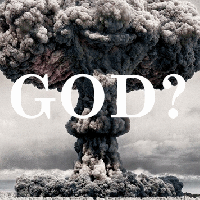
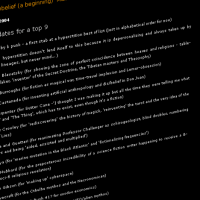
![12 Monkeys by Terry Gilliam [1995, Full Movie]](https://i0.wp.com/subliminalsensibility.weebly.com/uploads/8/1/5/5/81558528/twelve-monkeys_orig.jpg?resize=200%2C200&ssl=1)

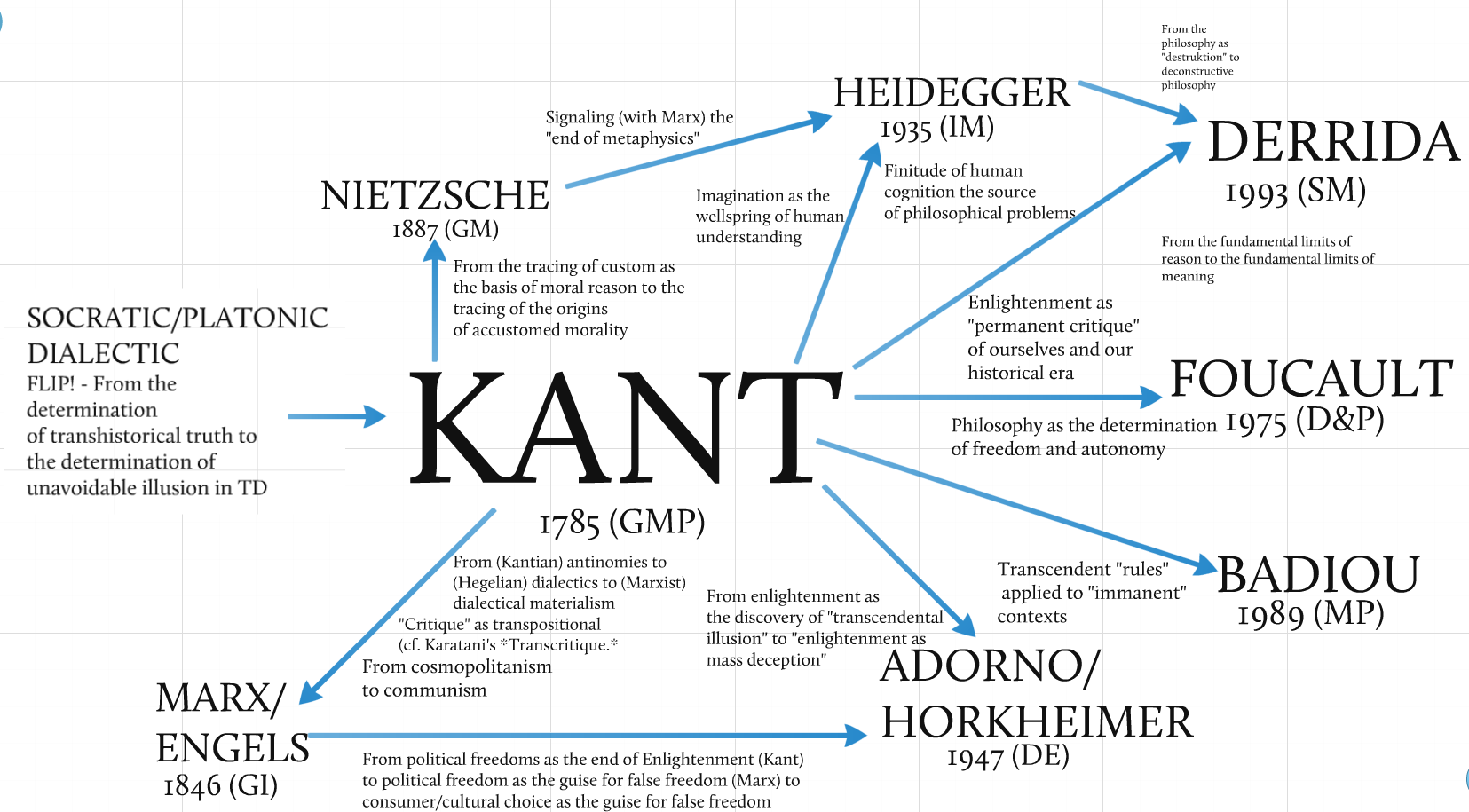


































Reblogged this on Senselogic.
LikeLike